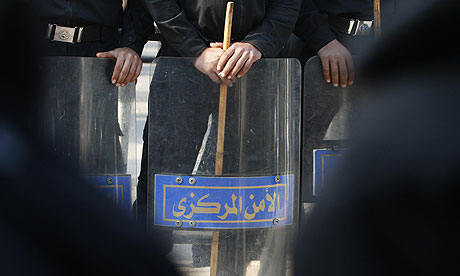
(AFP File Photo)
Prominent human rights lawyer Negad El-Borai has blamed the general prosecution for the “rampage of torture crimes in Egypt,” adding that it “investigates such crimes extremely slowly”.
El-Borai’s comments came during a press conference held by the United Group law firm to commemorate the 65th anniversary of issuing the Universal Declaration of Human Rights and discuss the firm’s first annual report on torture crimes. The report, run by the firm’s department of legal support for torture victims, defines torture as the illegal usage of power by state employees, mainly policemen, on civilians; it addresses the period between September 2012 and September 2013.
“Another problem with the prosecution is that they should investigate the crime of torture before investigating the original crime that the tortured defendant is charged with, which they don’t do. They just write down the torture complaint and go on with investigating the original case,” El-Borai said. United Group lawyer Mahmoud Rady said that prosecution does not allow lawyers to review torture cases most of the time.
He added: “Putting an end to torture requires political will, and a price that the ruling authority must pay… that price is choosing between security and human rights; in the long run, choosing human rights will [most] benefit society.”
El-Borai, who is the main partner in United Group, demanded that the forensics department be independent from the Ministry of Justice. He also demanded that the department be developed such that it is equipped to cope with the “huge number of violations that happen in Egypt”.
“The forensics reports about torture crimes are often submitted late due to the small number of employees in the department,” Al-Borai said.
The lawyer demanded the formation of a new prosecution department concerned with torture crimes: “It is in the authority of prosecutor general to form such a prosecution department.”
However, El-Borai said the new draft constitution is a “step forward, yet not enough to stop crimes of torture”.
The lawyer referred to articles 51 and 52 in the draft constitution, which state that human dignity is an untouchable right and that torture is a crime which is not subject to the statute of limitations. El-Borai explained that there is a problem with the definition of torture in Egyptian law: “State employee use illegal power on crime defendants only for the sake of obtaining confessions, for example.”
He said that a copy of the report was sent to Ministry of Interior Human Rights Department and to the General Prosecution.
The report analysed the demographics of the 193 torture victims studied: 22.7% of the victims are residents of Cairo, 16.6% live in Alexandria and 15.5% of victims in Beheira.
36.2% of the torture victims are between 21 and 30 years old, while 27.4% are between 31 and 40 years of age; 4.1% of the victims are over 50 years old.
According to the report, 45.5% of the victims belong to those of lower income brackets, 39% belong to a middle income brackets and 15.5% belong to upper income brackets.
89% of the torture victims are males and 11% are females.
El-Borai said that these figures are based on the sample of 193 victims and thus estimates are given regarding the percentage of torture crimes in Egypt.




